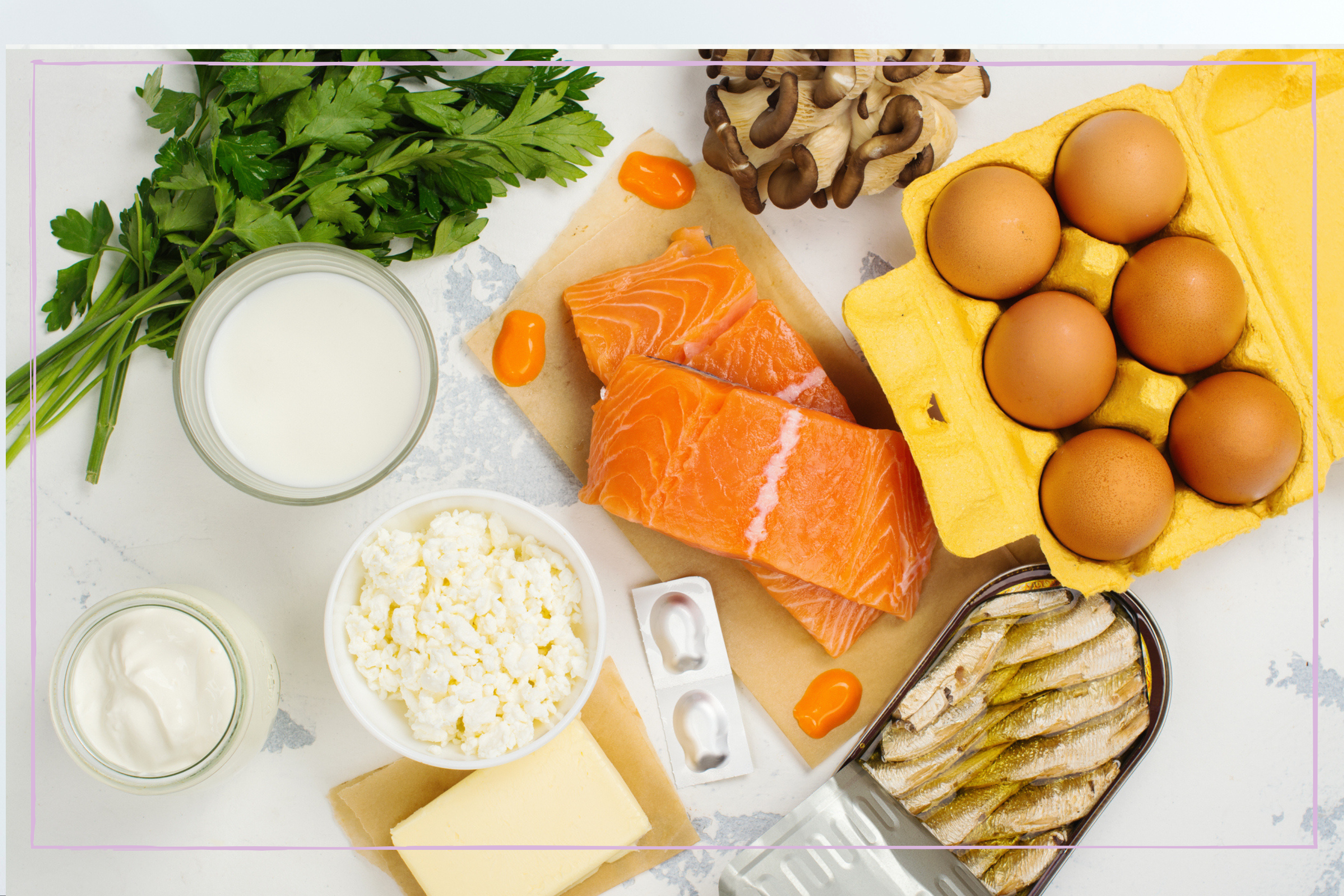Vitamin D foods: Do you know how to get your daily dose of vitamin D?
The best known way to get your daily dose is through sunlight, but that's not always easy to come by as the nights start drawing in....


Foods that are high in vitamin D are crucial for keeping your body healthy.
The best-known way to get your daily dose is through sunlight, but that's not always easy to come as the nights start drawing in. So how much vitamin D do you really need, and which foods could help you to top up?
Vitamin D is required for the normal function of the immune system, absorption of calcium and phosphorus, contributes to normal blood calcium levels and to the maintenance of normal bones, teeth and muscle function and is required for cell division,' says nutritionist Ella Allred. Studies have also shown that vitamin D can help to improve your sleep quality, and may reduce the risk of developing certain cancers, including breast cancer and pancreatic cancer.
According to the NHS, most people should be able to get all the vitamin D they need by eating a healthy balanced diet and by getting some sun. However, pregnant and breastfeeding women, children under the age of five or adults over the age of 65, and people who do not spend much time outside, could all need to give their vitamin D levels a boost.
The amount of melanin you have in your skin can also affect the amount of vitamin D you produce. 'White skin also requires less sunlight than darker skin tones to create the same amount of vitamin D, meaning that people with black or brown skin need to spend even more time in the sunlight,' Ella explains.
Vitamin D foods
1. Oily fish
Oily fish isn't just rich in vitamin D; it's packed with omega-3 fatty acids, protein, some B vitamins and selenium, all of which are essential for good health. Some of richest food sources are herring, salmon and pilchards.
- Sardines
- Tuna
- Mackerel
- Swordfish
- Wild salmon (8.6mcg per 100g)
- Herring (19mcg per 100g)
- Pilchards (canned in tomato sauce) (14mcg per 100g)
2. Eggs
Low in fat and high in protein, eggs have long been known as a nutritional powerhouse, and they're a great source of vitamin D as well. Try them scrambled, poached or, rather appropriately, sunny side up, to give your vitamin D levels a boost.
Parenting advice, hot topics, best buys and family finance tips delivered straight to your inbox.
3. Pork
Pork is pretty high up the vitamin D scale, beaten only by options like beef liver. Add pork chops or a medium cooked steak to your regular dinner rotation and you'll get a nutritious hit of the vitamin (even better, cook them on a barbecue in the sunshine!)
4. Milk
You probably already know that milk is good for your bones, but it's not just because of its calcium content. Whether you pour it over your cornflakes, stir it into your tea or blend it with fruit to make a smoothie, you're adding a little extra vitamin D to your day.
5. Yogurts
Yogurt has many of the same health benefits as milk, and many brands are fortified with additional vitamin D as well. Because vitamin D helps you to absorb calcium into your bones, choosing a yogurt that's rich in both could be doing your skeleton some serious favours.
6. Mushrooms
They count as one of your five-a-day, with good reason - mushrooms are on the list of vitamin D foods too. Shitake and button mushrooms are your best bets for getting the greatest dose.
7. Tofu
Great news, vegetarians and vegans - it's not just meat and dairy that can improve your vitamin D levels. Soy-based tofu is full of protein, zinc, calcium and cholesterol lowering omega 3 fatty acids, so it's worth adding to your diet even if you do eat animals.
8. Cheese
It's high in fat, so you shouldn't go too crazy on the Babybels, but cheese is also a decent provider of vitamin D. Ricotta and swiss are top choices, so enjoy a portion of either stirred into pasta or melted onto wholegrain toast or crackers.
9. Orange juice
Supplement your cereal with a glass of OJ and you'll be getting an even greater helping of vitamin D. Just be sure to check the label to check that your chosen brand has extra vitamin D included - some bottles have far more than others.
10. Butter
Butter is usually championed as the superfood, but both spreads are often enriched with extra vitamins, including vitamin D. Again, it's a case of choosing a brand that's richest in the nutrient, but once you've done the research, you can buy the same tub again and again.
11. Cod liver oil
Vitamin D foods are all well and good, but if you're after a powerful dose in a small package, you'll find it hard to do better than cod liver oil. They're also a brilliant supplier of vitamin A, and contain those all-important Omega 3s as well, supporting your bones, immune system function and skin simultaneously.
Vitamin D deficiency symptoms
'Vitamin D helps to keep your bones strong as it assists with the absorption of calcium and phosphorus,' says Healthspan nutritionist, Rob Hobson. ' This vitamin is also involved in muscle movement, immunity and nerves need it to carry messages throughout your body.' According to research published in the journal of Age and Ageing, it is estimated that around 1 billion people worldwide are vitamin D deficient. Deficiency symptoms may include:
- Constipation - Research published in the World Journal of Gastroenterology found chronic constipation was linked to vitamin d deficiency.
- Muscle weakness - In the North American Journal of Medical Sciences, they report that 30% of patients can show signs of muscle weakness before the signs of vitamin D deficiency appear.
- Recurrent infections - A variety of studies have found a link between vitamin D deficiency and respiratory tract infections such as bronchitis, colds and pneumonia.
- Muscle aches and pains - A variety of studies have found a link between vitamin D deficiency and respiratory tract infections such as bronchitis, colds and pneumonia. A study published in the journal of Pain Medicine found that 71% of people suffering with chronic pain were deficient in vitamin D.
- Bone pain - Research published in the Journal of Musculoskeletal Medicine, they report that vitamin D deficiency can lead to low bone mass and fractures. 'In severe cases of vitamin deficiency, it can cause rickets (young children) and osteomalacia (bone softening) in adults - more common in older adults, especially those in care or who spend a lot of time indoors,' says Rob.
What's the best way to get vitamin D?
How can I raise my vitamin D levels quickly?
The body obtains most of its vitamin D from sunlight. 'Very few foods offer a natural source of vitamin D and it is not possible to get what you need from natural foods alone,' says Rob. The quickest way to get vitamin D is from supplements which is why Public Health England recommends we all take a supplement during the winter months when the sun is not strong enough to supply what we need (alongside the fact we may spend more time indoors).
This recommendation has since been extended to during lockdown to account for the additional time spent indoors especially those who are shielding. The recommended intake is 10mcg per day.
'The most recent review carried out by the Scientific Advisory Committee on Nutrition (SACN) concluded that at risk groups include people who have little or no exposure to the sun e.g. older people in residential care and people who cover their skin when they are outside,' says Rob. 'People with dark skin (African, African-Carribbean and South Asian descent) may also not get enough vitamin D from sunlight in the summer as it is less easily absorbed to make vitamin D. These groups advised to take vitamin D all year round.'
Supplements are available in tablet form as well as gummies and sprays. The sprays are particularly good for people how do not like taking tablets and older people who can absorb vitamin D more easily through the mouth than the gut. Supplements contain vitamin D3 which is the form produced naturally in body in response to sunlight so more effective than D2 which needs to be converted to D3 in the body.
Healthspan Super Strength vitamin D3 - £11.95 for 240 tablets Healthspan Vitamin D Apple and Blackcurrant Gummies - £5.95 for 30 gummies
Rose Goodman joined Future Publishing in 2020 and writes across Goodto.com, Woman & Home, Woman, Chat and Woman’s Own magazines. Prior to pursuing her career as a writer, Rose obtained a degree in psychology and went on to work in adult mental health for five years at Addenbrooke’s Hospital, Cambridge, specialising in eating disorders. She is fully trained in first aid, medical emergency response and motivational interviewing – a directive, patient-style counselling approach to address ambivalence in recovery. She graduated with a MA in creative writing from the University of Brighton in 2017. In her spare time she enjoys writing poetry and attending literary events, and offers weekly support to those living with homelessness. Rose has a passion for raising awareness around mental illness and the importance of prioritising our wellbeing.
